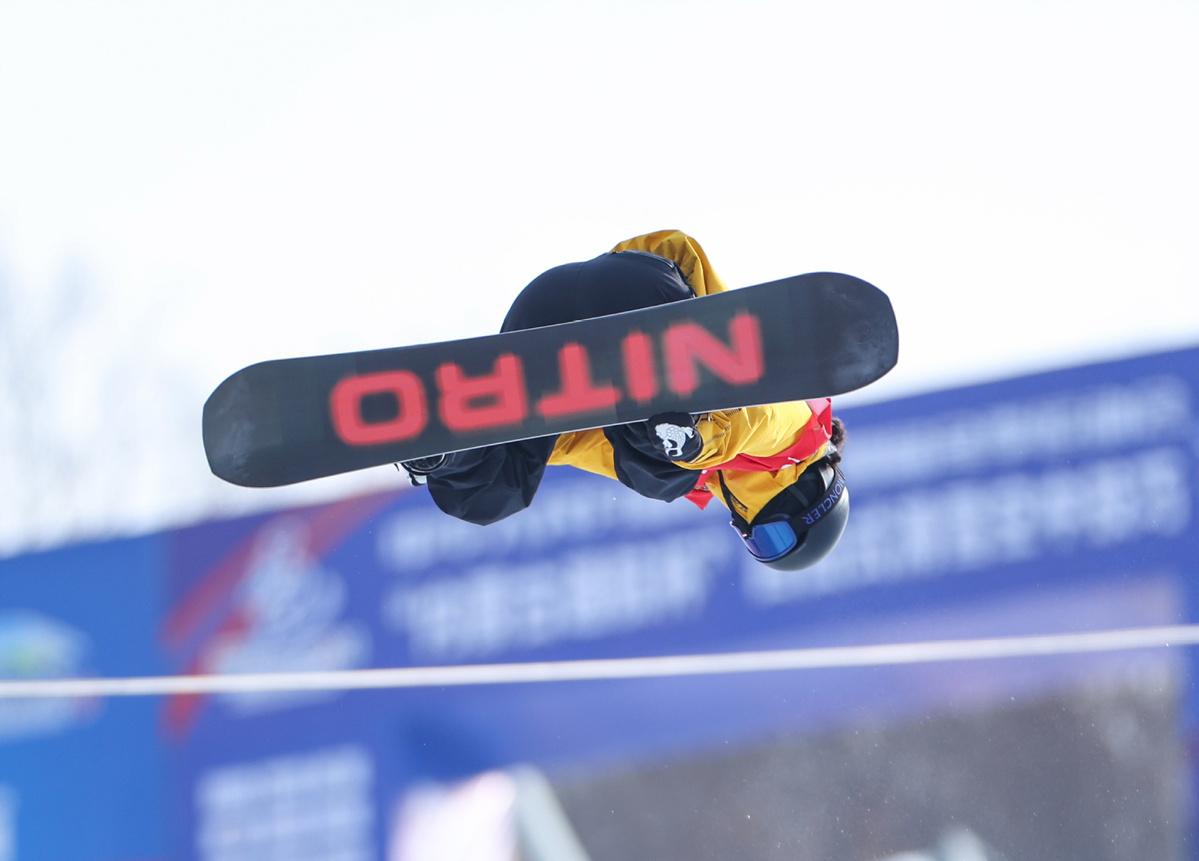
 0 Comment(s)
0 Comment(s) Print
Print E-mail China Daily, February 22, 2024
E-mail China Daily, February 22, 2024
"Relieved!" Cai Xuetong's succinct reaction to clinching halfpipe gold at China's 14th National Winter Games spoke volumes given the world champion snowboarder's illustrious career.

Cai Xuetong hopes to add an elusive Olympic medal to her collection at the 2026 Winter Games in Italy. The 30-year-old says she is enjoying snowboarding more than ever by placing less emphasis on results and focusing more on executing her tricks with style. XINHUA
At 30, Cai's resume boasts three world championship titles and 14 FIS World Cup golds, yet the victory at Zhalantun ski resort in Inner Mongolia on Saturday was far from just another medal in her collection.
"I have eventually accomplished one of my career ambitions by winning the national championship title," said Cai, who hopes the triumph brings her closer to the last remaining unchecked box in her medal-laden career: an Olympic podium finish.
Despite her success, Olympic glory has remained elusive for Cai, who has competed in four consecutive Winter Olympics since 2010.
"As for Olympic medals, who wouldn't be obsessed with them? But at the Beijing Winter Olympics, I realized that sometimes (missing the podium) is destiny. There are too many contingencies. It's not about how much effort I put in, it doesn't guarantee standing on the podium," she reasoned.
The women's snowboard halfpipe event at the Beijing Winter Olympics was the closest Cai came to the Olympic podium. After agonizingly finishing fourth, she sat alone at the back of the bus on the commute back from the competition, contemplating her near-miss in somber silence.
"That was the most memorable competition of my career. If I had remained immersed in the emotions of that time, I might have quit snowboarding," she reflected. "But when I wasn't snowboarding, I realized I still wanted to take my position on the halfpipe starting zone."
"I thought I still have the potential to achieve that Olympic dream. So, why should I stop?"
With the Milan-Cortina 2026 Winter Games in sight, she acknowledges it is her final opportunity for Olympic glory.
In extending her athletic journey, another factor also contributes massively to keeping her Olympic dream alive. Throughout her two-decade snowboarding career, she still possesses a profound love for the sport.
Cai's introduction to snowboarding is a tale familiar to many Chinese athletes. A sports school coach discovered her at age 10 while she was skating in a neighborhood park. This led to her embarking on a rigorous training regimen, day in and day out, year after year.
In 2004, as the halfpipe competition debuted at the Winter Olympics, China was in the process of forming a snowboarding team, and her selection was solely based on this emerging need.
During that period, snowboarding was little-known in China, with hardly anyone engaged in the sport or familiar with its culture.
"At that time, I only focused on achieving good results. I thought about how I could become a world champion or Olympic champion. I only concentrated on what tricks I could perform, without paying much attention to style and form when I executed that trick."
Through training and competitions, Cai has nurtured a deeper connection with the international snowboarding community. This has helped her realize that, in addition to the precise technical aspects, snowboarding also requires expression and creativity.
"Guidance from foreign coaches, as well as training and competing abroad, helped me connect with the authentic snowboarding culture," she explained.
Cai admitted that her understanding of snowboarding has undergone a wholesale transformation through the years.
"Now, for me, snowboarding is not just a competition, not just the halfpipe skills I engage in. Snowboarding is a relaxing feeling for me; it's also my way of life. I can chase snow all year round, slide down different snow-covered mountains. It's the most enjoyable thing for me so far," she said.
This shift in outlook is reflected in Cai's performances.
Observers may notice her riding style has become more powerful, bold and confident in recent years. And she's happy to accept such evaluations.
"In fact, now when I watch some new riders, even if they don't ultimately stand on the podium or make it to the finals, I appreciate their riding style," she said.
Cai took up snowboarding at age 10, but admits that the new generation of riders who start even younger are taking the sport to new heights. She describes them as "snow natives".
"For example, the 12-year-old Patti (Zhou Yizhu), who just competed with me at the National Winter Games, is already well-known in the snowboarding community. She's exceptionally talented.
"My generation faced many challenges when venturing into snowboarding; every step was a trial. But now they have matured in technique and experience."
Cai insists the young guns inspire her to continue exploring the possibilities of snowboarding and credits the newcomers with helping keep her youthful spirit alive.
"This is why, at the age of 30, I still want to snowboard. I want to enjoy the happiness that this sport brings me for a few more years," she added.
"I also hope that Chinese snowboarding is sustainable, with generations of riders progressively moving up."
As Cai prepares for her potential last shot at Olympic glory, she remains focused on her inner happiness and the joy snowboarding brings her.
"I want to listen to my heart," she concluded. "I need to make myself happy from within."
Go to Forum >>0 Comment(s)